The Hydration vs Strength Starter Plan: What Your Hair Actually Needs
💬 Your Hair Feels Off—But You’re Not Sure What It Needs
It’s limp… but frizzy.
It breaks… but still gets oily.
It won’t hold shape… but feels rough.
And every product seems to make it worse.
You start asking:
Do I need more hydration?
Do I need protein?
Am I damaging it just by guessing?
This guide will help you figure out what your hair is truly asking for—so you can respond with care, not confusion.
🧬 Hair Doesn’t Lie—But It Can Be Misunderstood
Let’s break down the real signs of what your hair needs, based on how it behaves—not how it looks for one hour after styling.
✳️ 1. If It Feels Rough AND Breaks Easily, You Need Hydration
What you’re seeing:
Hair that feels straw-like
Flyaways that don’t soften
Split ends
A dry “halo” around the crown
Why it’s happening:
Water isn’t staying inside your strands
Your scalp might also be dehydrated
You may be overwashing or heat-styling without protection
📍Skin Management for Anti-Aging addresses skin dehydration around the forehead and temples—helping your scalp retain more water long-term.
✳️ 2. If It Feels Soft BUT Won’t Hold Shape, You Need Strength
What you’re seeing:
Hair that curls, then collapses
A crown that flattens midday
Ends that stretch when wet
A “mushy” feel when applying product
Why it’s happening:
The internal structure is weakening
You’ve over-conditioned or under-supported your hair’s core
Follicles are producing finer, softer strands
📍Hairline Embroidery helps support visual strength while internal follicle health catches up.
✳️ 3. If Your Hair Is Oily BUT Feels Brittle, Your Scalp Is Confused
What you’re seeing:
Greasy roots within 24 hours
Dry ends that won’t soften
Tangled hair even when brushed
Flaky scalp that doesn’t flake off
Why it’s happening:
Your scalp is overproducing oil to compensate for inflammation or dryness
Your wash routine may be stripping too harshly
Your scalp barrier is likely compromised
📍Marine Spicules Skin Renewal helps reset oil balance without harsh scrubbing—calming the scalp and protecting follicles.
✳️ 4. If You Can’t Tell What It Needs—It Might Be Stress
Sometimes, your hair feels different because you feel different.
You’ve been tired
Sleeping irregularly
Not eating well
Tying it up too much
Overanalyzing every strand
📍Lymphatic Bojin Tisheng clears head and jawline tension, resets circulation, and relieves the stress that often shows up first in your hair.
✳️ 5. Check the Last 4 Weeks—Not the Last 4 Days
Your hair doesn’t respond instantly. It responds accumulatively.
Ask:
Have I been consistent?
Have I given it rest days?
Have I changed products too often?
Have I felt emotionally calm around my hair?
📍Still unsure what your hair is asking for? Start with our FAQ or contact us directly.
💬 Stop Guessing. Start Listening.
Once you understand whether your hair needs hydration, strength, or just time to recalibrate—you can stop reacting and start responding.
This 2-week reset helps build internal support for your strands and external softness for your scalp—without stressing your system further.
🌿 Week 1: Hydration First
✅ Step 1: Mist and Press—Daily
Use a water-based mist (no oils or actives)
Press it into the scalp gently with warm fingers
Don’t rub or scrub—just soak and support
📍Pair with Eyebrow Regrowth Booster to extend hydration-focused recovery across your entire upper face and follicle zones.
✅ Step 2: Cool Rinse After Shampoo
Use lukewarm water during wash
Finish with a 15-second cool rinse at the scalp
This locks in hydration and reduces swelling around the follicle
📍Follow with a towel press—not a rub—and let hair air dry at least 50% before tying it up.
✅ Step 3: Low-Friction Nights
Sleep on silk or satin
Avoid overnight buns or slick ponytails
Let your scalp breathe
Braid gently if needed—but avoid scalp tension
📍Consider Skin Management for Anti-Aging for added relief around the brow and temple zones—common places for dehydration and pull tension to hide.
🌿 Week 2: Add Strength—Without Aggression
✅ Step 4: Introduce One Strength Support Product (or Tool)
Use a light protein treatment on mid-lengths only
Or: add a wide-tooth comb and begin brushing daily from nape to crown
Limit usage to 2x per week—no daily strength overload
📍Hairline Regrowth Microneedling boosts collagen and circulation in weak-growth zones and helps structure return to fine, patchy strands.
✅ Step 5: Framing to Boost Confidence (While Strength Builds Quietly)
Hair strength takes time. Confidence doesn’t have to.
📍Lip Embroidery Blush gives your face instant contrast and glow—redirecting the eye while upper regions recover slowly and steadily.
✨ La Dermalogique Support: For When Hydration Alone Isn’t Enough
If your scalp feels tight, your stress shows on your face, or your ends snap no matter how much you hydrate—here’s what to pair your rhythm with:
✅ Lymphatic Bojin Tisheng
Best for:
Facial tension
Puffy scalp zones
Hair loss with emotional stress
What it does:
Clears blockages
Encourages internal water flow
Reinvigorates oxygen to follicles under tension
✅ Marine Spicules Skin Renewal
Best for:
Clogged follicles
Dry scalp with oily surface
Poor product absorption
What it does:
Clears buildup gently
Stimulates healthy skin turnover
Supports deeper hydration after treatment
📋 What to Expect After 2 Weeks
Day 3: Brushing feels easier
Day 7: Less frizz and more flexibility
Day 10: Temples and crown appear softer, not thinner
Day 14: You feel more trust in your rhythm—and less anxiety over “perfect” products
❓ FAQ
“Can I use both hydration and strength treatments together?”
Yes—but alternate them. Think hydrate, rest, strengthen, rest. Avoid doubling up on the same day.
“What are signs of too much protein?”
Hair feels brittle, rough, or stiff—despite being freshly washed or conditioned.
“How do I track what’s working?”
Use natural light photos of your part and temples once a week. Look for soft density—not drastic changes.
💗 When You Know What Your Hair Needs, Everything Changes
You don’t need 10 products.
You don’t need to panic.
You just need to understand what your hair is asking for—and respond with rhythm, not reaction.
📌 Book your regrowth support session now
📌 Explore scalp-safe services like Microneedling or Hairline Embroidery
📌 Or message our care team to build your recovery strategy with kindness and clarity
Your hair knows when you’re listening. And it always responds better when you do.





